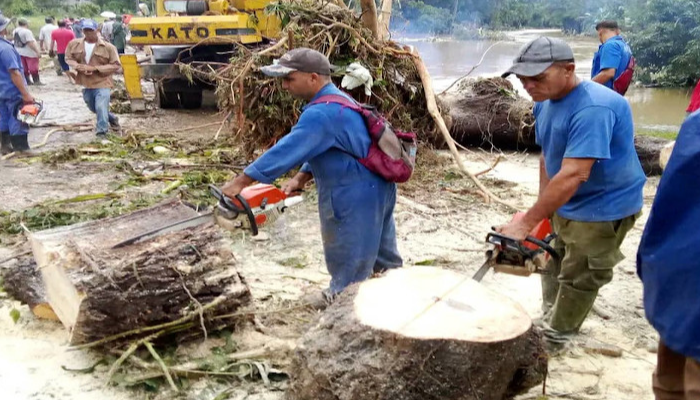
In Contramaestre, Santiago de Cuba, the task is arduous, but together they are overcoming the obstacles.
obstacles. Photo: Grito de Baire
Havana, June 13 (RHC)-- Cuba is making progress on Tuesday in the recovery of territories affected by heavy rains in the center and east of the country, with the premise of safeguarding people and without neglecting material resources.
Given the vast experience accumulated by the island before meteorological phenomena of these characteristics and powerful hurricanes, the political and government authorities and the Civil Defense forces activated the Defense Councils in the most affected provinces, which allowed moving on to the recovery phase shortly, once the rainfall ceased.
From Sancti Spíritus (center), Prensa Latina news agency reported that the rains caused by the storm surge in the Gulf of Mexico benefited the agricultural programs and contributed to the increase in the flow of the dams, although the Zaza dam (the largest in the country) has barely 35 percent of its useful capacity, which is indispensable for the development of rice production in the south of that territory.
Camagüey (central-east) -the most affected area- is returning to normal, and the victims, especially those living on the banks of the Tínima and Hatibonico rivers, are gradually being cared for.
According to the governor of the province, Jorge Enrique Sutil, the main damages were in the capital city, and in agriculture and housing in the municipalities of Vertientes and Florida, however there was no loss of human lives.
Prensa Latina's correspondent in Holguín said that in the municipality of Cacocum, the more than 180 millimeters of rainfall reported, well above its average, caused the community of Yaguabo to remain flooded due to the saturation of the soil and the breakage of an irrigation channel of the Azcuba Sugar Company.
About 150 houses are affected by the water level, so the work is intense to solve as soon as possible the damages in the three segments of the canal.
This situation puts other communities in the same municipality at risk, such as Limoncito, while access to Altagracia is still difficult due to the poor condition of the roads.
As a result of the heavy rainfall in recent days, six people died, it was learned on Monday during a working meeting headed by President Miguel Díaz-Canel, who indicated to deploy efforts to meet the needs of housing in these territories, without detracting priority to the situation left by Hurricane Ian, in the western province of Pinar del Río, in September last year.
It was noted that the greatest damage was concentrated on roads, railways, housing, agriculture and, in particular, various crops, while most of the damage to electrical service and communications has been resolved.
It was also reported that the rains caused a significant increase in the amount of water in reservoirs, which is beneficial after two previous months of intense drought.
The causes of the natural event are attributed to climate change, and a call was made to analyze the experiences in order to update national disaster reduction plans.
The National Institute of Hydraulic Resources announced that in 10 days Cuba reported an accumulated rainfall of 146.2 millimeters (mm), 75 percent of the historical average for June.
The most significant figures were recorded in Camagüey, with 289.7 mm, 145 percent, Granma 281.2 mm (167), Santiago de Cuba 226.1 mm (146), Las Tunas 214.9 mm (137) and Holguín 204.3 mm (143).

